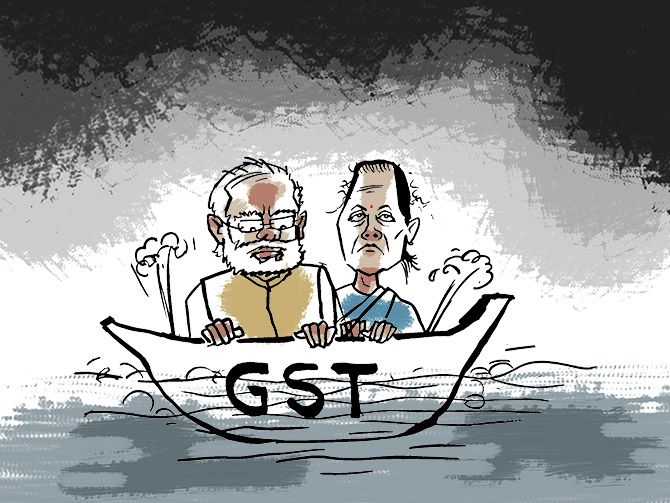If the items and services such selected subsequently pass the test from the fitment committee and the GST Council, this would be the first of such rate hikes, after a series of cuts in the process of rate rationalisation that started in November 2017.
Illustration: Dominic Xavier/Rediff.com

The finance ministry, faced with a steep revenue collection target for 2019-20, is exploring whether the Goods and Services Tax (GST) can be imposed on certain items and services that are exempt, and if rates can be increased on those in the lowest slab.
Business Standard has learnt that proposals such as raising rates on goods and services attracting zero to 5 per cent, and to 12 per cent from 5 per cent for some line items, are being considered in a bid to counter the shortfall in GST collection.
GST proceeds fell to a 19-month low of Rs 91,916 crore in September.
The government’s monthly GST collection target is Rs 1.18 trillion.
A finance ministry official said on condition of anonymity that there was a possibility that private health services or private college and universities (education services), for example, could be taxed under the GST.
Separately, a committee of senior officers from the GST Council and state GST commissioners has been formed to focus on and suggest measures to augment GST revenues, an official order said.
This committee will consider steps to improve voluntary compliance, changes needed in the law, and data analytics for anti-evasion measures, in addition to strategies to expand the tax base.
It will submit its initial recommendations in a report to the GST Council before Diwali (by October 25), and the Council will then monitor the completion of the committee’s work thereon.
On the ongoing study, the official mentioned above said, “The study is being done because revenue growth has weakened, and the primary reason is that many value chains are not yet under the GST net.”
Another senior official said better revenue would help states more, as they were feeling a harder pinch of revenue slowdown.
While the Centre’s GST revenue has risen a healthy 13 per cent till August in the current financial year, the revenue for seven big states has contracted 5 per cent, needing an unprecedented outgo as compensation to states.
“State GST machinery is not as strong as the Centre’s when it comes to enforcement and revenue collection,” said the first official.
If the items and services such selected subsequently pass the test from the fitment committee and the GST Council, this would be the first of such rate hikes, after a series of cuts in the process of rate rationalisation that started in November 2017.
At present, raw materials for textile and leather industries are in the list of items taxed at 5 per cent, and gold is taxed at 3 per cent, while many products and services such as education, health, and unbranded food items are exempt.
The effective GST rate on all items put together stands at 11.6 per cent, down about three percentage points from 14.4 per cent in the pre-GST regime, according to the Reserve Bank of India (RBI).












 © 2025
© 2025